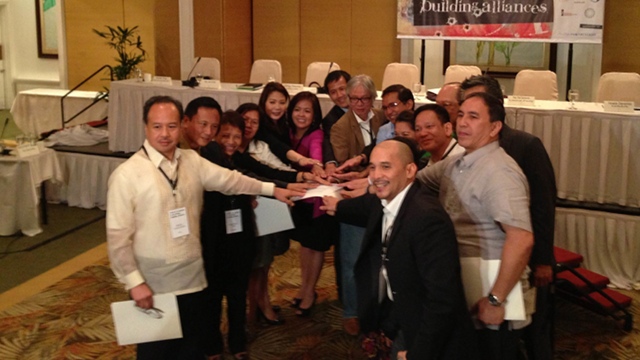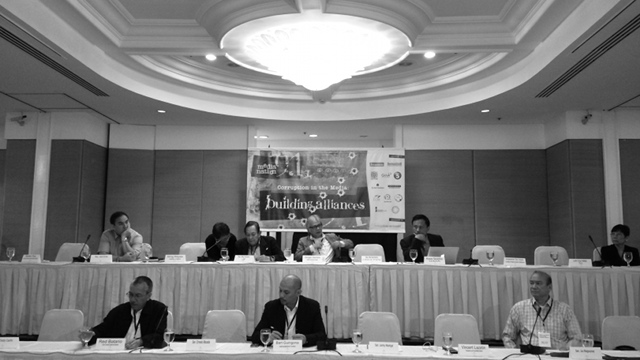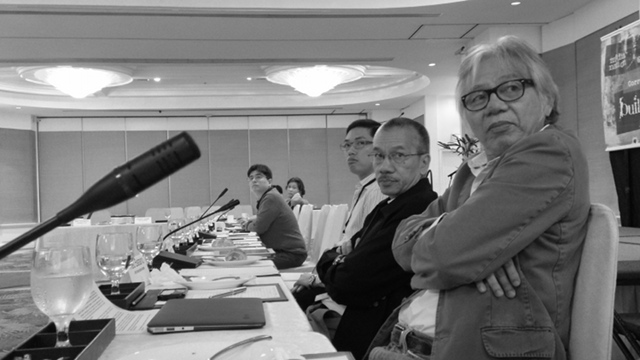SUMMARY
This is AI generated summarization, which may have errors. For context, always refer to the full article.
MANILA, Philippines (UPDATED) – Filipino journalists know the media become even more plagued with corruption during the election season. So this year a handful of journalists are acting early.
On January 22, nearly 20 prominent journalists and politicians signed a pledge promising not to accept pay for favors. Honesty and accountablity may seem like a given for journalists, but the public agreement is a big step in a country where a super majority of journalists is acknowledged to be corrupt.
“We have thus decided to come together to reject the corruption in media, in its varied forms, that has always marred Philippine elections,” read the covenant, which was signed by Business World chairman Vergel Santos, GMA News Online editor-in-chief Howie Severino, ABS-CBN chief Ging Reyes, TV5 chief Luchi Cruz-Valdez Rappler editor-at-large Marites Vitug, LDP spokesman Mike Romero, Cagayan Rep Juan Ponce Enrile Jr., and former senator Ramon “Jun” Magsaysay Jr.
There is hope that many other journalists and politicians will also sign on or before Election Day, which is generally a time when corruption worsens in both media and politics.
“Elections present a special opportunity. One with people looking to be elected and buying elections. And on the other side (there are) people willing to be bought. It’s as simple as that,” said Santos.
Bart Guingona who heads MediaNation, the group which convened journalists to draft and sign the compact, explained that as many as 90% of journalists may engage in mild forms of corruption during elections.
“There’s a large gray area, even accepting a ride from a politician or a T-shirt, and all these things are corrupt in their own way. So if you look at that I’d say about 90% but we haven’t even defined what corruption is clearly,” he said.
With so many unethical journalists, sheer numbers seem to be against the effort. Guingona explained that about 80% of local media organizations and practioners are not represented at Media Nation. Still he pointed out that the 20% who did sign are movers and shakers in the industry, so many other journalists will hopefully follow suit.
The jury is out to see if the self-policing measure will work. But stakeholders agree it’s a good first step. Many say it is about time.
“This is really an expression of frustration, nothing has changed for the past 40 years in terms of how media corruption happens during elections. So everyone is very optimistic,” said Guingona.
“It is renewing a social contract so that elections suddenly have meaning again in this country. And media is acknowledging the power of media to make democracy work,” he added.
Speaking for politicians, Romero said, “It’s a step in the right direction. It’s not a solution but you have started something important for the future because really corruption abounds all over.”

Read the full text of the ‘Covenant Against Media Corruption 2013’ below:
We – representatives of political parties participating in the 2013 vote and media organizations covering it – confront a painful and persistent truth: Media corruption damages our society, especially during elections. We recognize that there are political candidates and media practitioners who uphold the highest ethical standards, but we also realize that the problem is real.
We have thus decided to come together to reject the corruption in media, in its varied forms, that has always marred Philippine elections.
In particular, the political signatories pledge not to engage in “envelopmental” journalism—-the payment (or offer of payment) by political parties or candidates to journalists and other media practitioners and their principals for media favors. And the media signatories pledge not to tolerate the practice of “envelopmental” journalism, or to solicit payment from political candidates for media favors. In sum, the parties and their candidates publicly commit that they will not offer journalists and other media practitioners and their principals any payment or form of compensation for favors; the media signatories also publicly commit that they will neither accept nor solicit any such payment or form of compensation for favors.
This excludes exposure through legitimate advertising.
We further commit ourselves to reporting instances of corruption in the media: In the case of the news subjects/sources among us, to report these to the media; in the case of us journalists, to report on these in our media.
We appeal to those who have not signed this Covenant to do so and thus live up to these promises because they are what the public expects and deserves from both government and media—-two vital institutions that citizens must be able to trust.
This Covenant is just a single step in a larger process to root out corruption, itself a complex problem. But solutions begin with the acknowledgement and discussion of the problem.
The coming elections provide an opportunity for this initial effort towards self- cleansing, and renewing our commitment to public service.
We believe that this Covenant will open the kind of public discourse that will lead to action against media corruption, and consequently repair the great damage it has done to our society. – Rappler.com
Add a comment
How does this make you feel?


There are no comments yet. Add your comment to start the conversation.